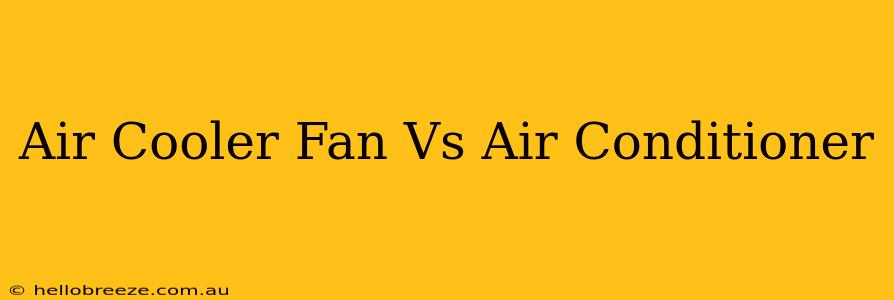Summer heat can be brutal, leaving you searching for relief. Two popular options battle for dominance in the cooling arena: air cooler fans and air conditioners. But which one reigns supreme? The answer, as with most things, depends on your specific needs and circumstances. This comprehensive guide breaks down the key differences between air cooler fans and air conditioners to help you make the best choice for your home and budget.
Understanding the Cooling Mechanisms
Before diving into the comparison, let's understand how each device works:
Air Cooler Fans (Evaporative Coolers):
Air cooler fans, also known as evaporative coolers, work on the principle of evaporative cooling. They draw in hot, dry air and pass it over a wet filter or pad. As the water evaporates, it absorbs heat from the air, resulting in a cooler breeze. This method is particularly effective in dry climates where the air has low humidity.
Air Conditioners:
Air conditioners operate on a completely different principle – refrigeration. They use a refrigerant to absorb heat from the air inside your home and release it outside. This process lowers the temperature of the indoor air significantly, regardless of the outside humidity.
Key Differences: Air Cooler Fan vs Air Conditioner
| Feature | Air Cooler Fan | Air Conditioner |
|---|---|---|
| Cooling Method | Evaporative Cooling | Refrigeration |
| Effectiveness | Best in dry climates; less effective in humid areas | Effective in all climates |
| Energy Efficiency | Generally more energy-efficient than AC | Can be energy-intensive, depending on size and efficiency |
| Cost | Significantly cheaper to purchase and operate | More expensive to purchase and operate |
| Humidity | Increases humidity | Decreases humidity |
| Maintenance | Requires regular cleaning and filter replacement | Requires professional maintenance occasionally |
| Noise Level | Typically quieter than AC | Can be noisy, depending on the unit |
| Portability | Many models are portable | Most models are less portable |
Air Cooler Fan: Pros and Cons
Pros:
- Cost-effective: Significantly cheaper to buy and run than an air conditioner.
- Energy-efficient: Uses less electricity, contributing to lower energy bills.
- Easy to maintain: Generally requires minimal maintenance.
- Adds humidity: Beneficial in dry climates.
- Environmentally friendly: Uses less energy than air conditioners.
Cons:
- Ineffective in humid climates: Doesn't work well in areas with high humidity.
- Limited cooling power: Doesn't lower the temperature as much as an air conditioner.
- Requires water: Needs a regular water supply.
Air Conditioner: Pros and Cons
Pros:
- Powerful cooling: Effectively cools even in hot and humid climates.
- Consistent temperature: Maintains a consistent indoor temperature.
- Reduces humidity: Creates a more comfortable environment in humid areas.
Cons:
- Expensive: High initial cost and higher running costs compared to air cooler fans.
- Energy-intensive: Consumes more electricity, leading to higher energy bills.
- Requires professional installation: Often requires professional installation for larger units.
- Can be noisy: Some models can be quite noisy.
Which is Right for You?
The best choice depends on your specific needs:
-
Choose an air cooler fan if: You live in a dry climate, have a limited budget, prioritize energy efficiency, and don't need intense cooling.
-
Choose an air conditioner if: You live in a humid climate, require powerful cooling, need consistent temperature control, and are willing to invest more upfront.
Ultimately, understanding the differences between air cooler fans and air conditioners empowers you to make an informed decision that suits your needs and budget. Consider the climate you live in, your budget, and your cooling needs to choose the best option for staying comfortable all summer long.

